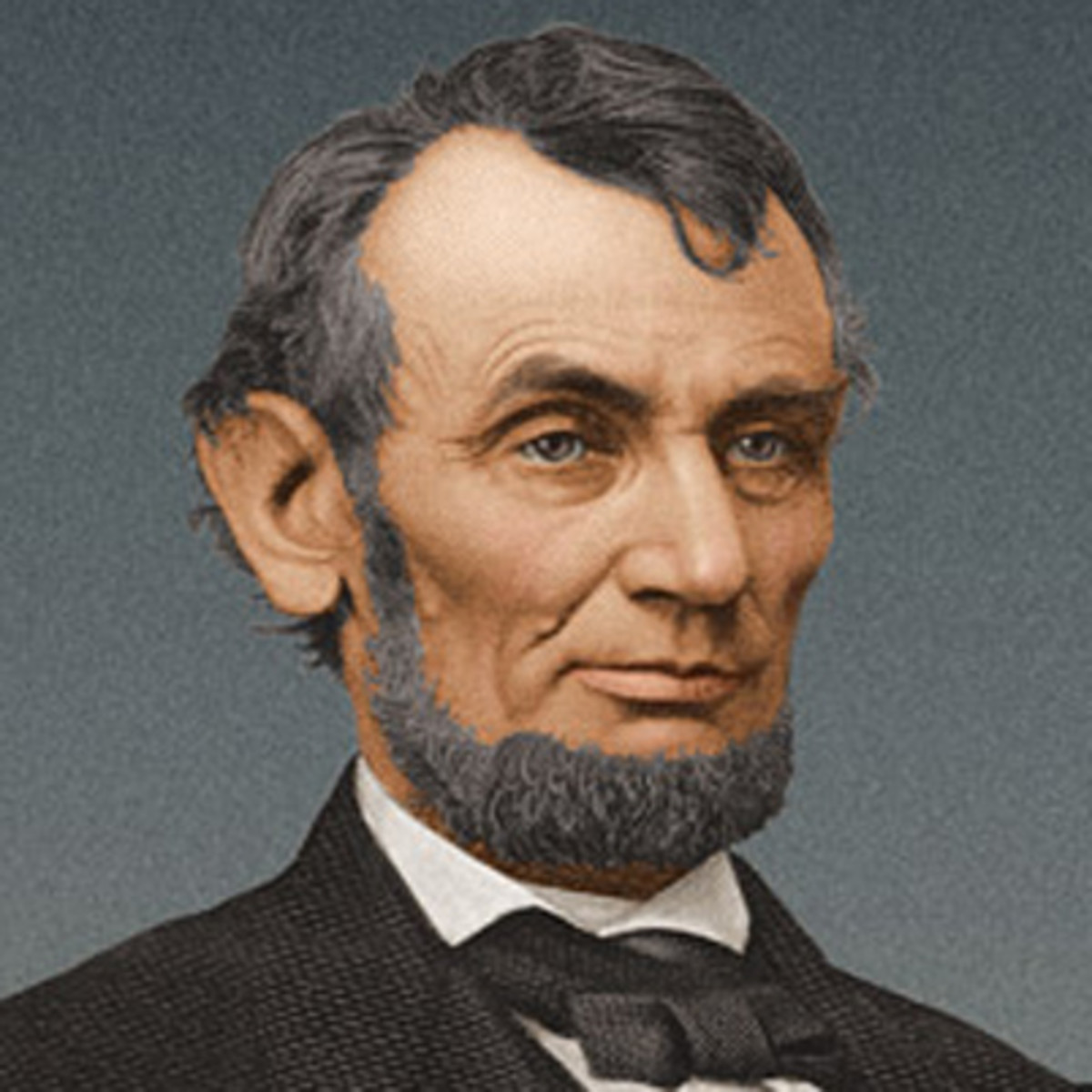Abraham Lincoln
Abraham Lincoln
U.S. Representative, U.S. President, Lawyer
- Hodgenville, Kentucky
Abraham Lincoln was the 16th president of the United States. He preserved the Union during the U.S. Civil War and brought about the emancipation of slaves.
Abraham Lincoln (February 12, 1809 to April 14, 1865) was the 16th president of the United States and is regarded as one of America's greatest heroes due to his role as savior of the Union and emancipator of the slaves. His rise from humble beginnings to achieving the highest office in the land is a remarkable story. He was suddenly and tragically assassinated at a time when his country needed him to complete the great task remaining before the nation.
Birth
Abraham Lincoln was born in a log cabin in Hardin County, Kentucky, on February 12, 1809.
Family
Abraham Lincoln was born to Thomas Lincoln and Nancy Hanks Lincoln. The couple had two other children: Abraham's older sister Sarah and younger brother Thomas, who died in infancy.
When young Abraham was nine years old, his mother died of tremetol (milk sickness) at age 34, on October 5, 1818.In December 1819, just over a year after his mother’s death, Lincoln’s father Thomas married Sarah Bush Johnston, a Kentucky widow with three children of her own. She was a strong and affectionate woman with whom Abraham quickly bonded.
Childhood and Education
The Lincolns were forced to move from Abraham’s birthplace of Kentucky to Perry County, Indiana, due to a land dispute in 1817.
Though both his parents were most likely illiterate, Thomas’ new wife Sarah encouraged Abraham to read. It was while growing into manhood that Abraham Lincoln received his formal education — an estimated total of 18 months — a few days or weeks at a time. Reading material was in short supply in the Indiana wilderness. Neighbors recalled how Abraham would walk for miles to borrow a book. He undoubtedly read the family Bible and probably other popular books at that time such as Robinson Crusoe, Pilgrims Progress and Aesop’s Fables.
In March, 1830, the family again migrated, this time to Macon County, Illinois.
Young Abraham Lincoln eventually migrated to the small community of New Salem, Illinois, where over a period of years he worked as a shopkeeper, postmaster and eventually general store owner. It was there that Lincoln, working with the public, acquired social skills and honed storytelling talent that made him popular with the locals.
Wife and Kids
Abraham Lincoln was married to Mary Todd on November 4, 1842. Todd was a high-spirited, well-educated woman from a distinguished Kentucky family. In 1841, the engagement was suddenly broken off, most likely at Lincoln's initiative. Mary and Abraham met later at a social function and eventually married in 1842. The couple had four children, of which only one, Robert, survived to adulthood.
Lincoln as Lawyer and Politician
In 1834 Abraham Lincoln began his political career and was elected to the Illinois state legislature as a member of the Whig Party. It was around this time that he decided to become a lawyer, teaching himself the law by reading William Blackstone's Commentaries on the Laws of England. After being admitted to the bar in 1837, he moved to Springfield, Illinois, and began to practice in the John T. Stuart law firm.
Abraham Lincoln served a single term in the U.S. House of Representatives from 1847 to 1849. He used his term in office to speak out against the Mexican-American War and supported Zachary Taylor for president in 1848. His criticism of the war made him unpopular back home and he decided not to run for second term, but instead returned to Springfield to practice law.
By the 1850s, the railroad industry was moving west and Illinois found itself becoming a major hub for various companies. Abraham Lincoln served as a lobbyist for the Illinois Central Railroad as its company attorney.
Lincoln’s Election to the Presidency
In 1860, political operatives in Illinois organized a campaign to support Abraham Lincoln for the presidency. On May 18, at the Republican National Convention in Chicago, Lincoln surpassed better known candidates such as William Seward of New York and Salmon P. Chase of Ohio. Lincoln's nomination was due in part to his moderate views on slavery, his support for improving the national infrastructure, and the protective tariff.
In the general election, Lincoln faced his friend and rival, Stephan Douglas, this time besting him in a four-way race that included John C. Breckinridge of the Northern Democrats and John Bell of the Constitution Party. Lincoln received not quite 40 percent of the popular vote, but carried 180 of 303 Electoral votes.
Famous Speech: The Gettysburg Address
On November 19, 1863, Lincoln addressed a crowd of around 15,000 people, Lincoln delivered his 272-word speech at one of the bloodiest battlefields of the Civil War, the National Cemetery of Gettysburg, in Pennsylvania.
Assassination
Abraham Lincoln was shot on April 14, 1865, by well-known actor and Confederate sympathizer John Wilkes Booth at Ford's Theatre in Washington, D.C.

